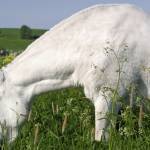Muscle-Wasting in Old Horses

As horses age, their bodies transform, often in ways owners don’t expect. Muscular mass, for example, changes noticeably enough in some horses that certain regions of their bodies take on completely different shapes.
“Muscle-wasting, also known as sarcopenia, is common in aged horses and describes generalized muscle loss that gradually results in weakness,” said Laura Petroski, B.V.M.S., a veterinarian at Kentucky Equine Research. Sarcopenia may be related to “inflammaging,” a low-grade inflammatory state associated with old age that makes horses more susceptible to infection and disease.
Sarcopenia is most frequently noticed in large muscle groups, such as those along the topline and over the hindquarters, as well as those of the forearm. The vertebral chain may seem more prominent than usual, as may the hip bones.
“This condition tends to occur in old horses that are not exercised, improperly nourished, or have been diagnosed with pituitary pars intermedia dysfunction (PPID),” explained Petroski. “Horses that have neurological disease sometimes have muscle atrophy, but the collection of clinical signs that neurological horses show differs from sarcopenia.”
To offset the development of sarcopenia, aged horses should be fed high-quality diets that align with their workload and metabolism. Because protein is not synthesized as efficiently in old horses as in young, it is important that old horses have access to high-quality protein, which is defined as protein that contains an array of essential amino acids.
Good-quality forage combined with a balancer pellet (for easy keepers) or a senior feed (for horses that require additional calories to maintain weight) are jumping-off points for a sound diet. Depending on the horse’s age and dental health, forage may be supplied in conventional ways, as pasture or hay, or as alternative forage sources, such as hay pellets.
“A full diet analysis provided by an equine nutritionist will ensure all nutrient requirements are met and any inadequacies addressed,” said Petroski.
In addition to a well-rounded, fortified diet, supplementation with immune- and muscle-supporting nutrients may help horses with inflammaging and sarcopenia.
Certain long-chain omega-3 fatty acids, specifically docosahexaenoic acid (DHA) and eicosapentaenoic acid (EPA), reduce body-wide inflammation and strengthen the immune system. In choosing a supplement with DHA and EPA, look for a marine-derived source, like fish oil, which is a direct source of essential omega-3s. A proven source of DHA and EPA is EO-3, developed by Kentucky Equine Research.
Vitamin E is a well-known antioxidant that supports immune integrity. Like omega-3 fatty acids, not all vitamin E supplements share the same bioavailability. Numerous studies in horses have shown that natural-source vitamin E is more effective than synthetic vitamin E. Beyond that, how vitamin E is delivered matters. Nano-E, a natural-source vitamin E, uses liposome encapsulation and nanodispersion technology to confer rapid bioavailability.
Vitamin E is especially important for horses that do not have access to fresh, green grass. Preserved forages, even when they are made under ideal conditions, undergo vitamin degradation during storage, so it is important to supplement with natural-source vitamin E.
In addition to nutrition, owners of old, sound horses can use exercise to increase fitness and health. By itself, age does not preclude a horse from engaging in physical activity, and an exercise program can keep a horse from developing muscle loss and may stave off metabolic issues. If soundness impedes moderate or intense exercise, horses can become and remain fit through thoughtful low-speed work, such as walking, slow trotting, and tackling hills. Work with a veterinarian and a farrier to help devise an appropriate fitness program that meshes comfortably with soundness, and be sure to tell the nutritionist about any changes in workload.








